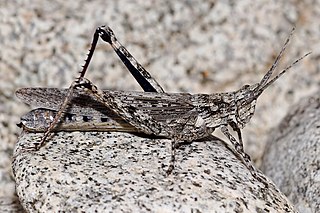
Acrididae, commonly called short-horned grasshoppers, are the predominant family of grasshoppers, comprising some 10,000 of the 11,000 species of the entire suborder Caelifera. The Acrididae are best known because all locusts are of the Acrididae. The subfamily Oedipodinae is sometimes classified as a distinct family Oedipodidae in the superfamily Acridoidea. Acrididae grasshoppers are characterized by relatively short and stout antennae, and tympana on the side of the first abdominal segment.
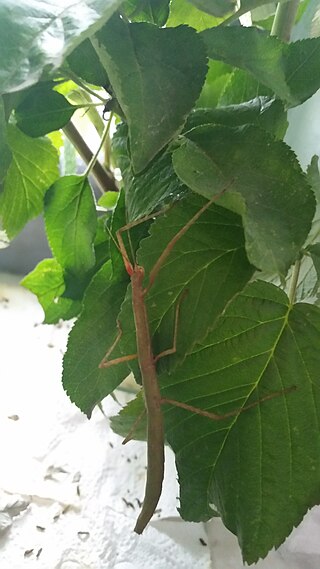
Carausius is a genus of the tribe Lonchodini, in the order Phasmatodea. The genus is in many ways typical of the Phasmatodea in that all species are twig-like in appearance. These species are parthenogenetic.

The Euphasmatodea, also known by its junior synonym Verophasmatodea is a suborder of the Phasmatodea, which contains the vast majority of the extant species of stick and leaf insects, excluding the Timematodea. The oldest record of Euphasmatodea is Araripephasma from the Crato Formation of Brazil, dating to the Aptian stage of the Early Cretaceous.
Mnesilochus is a genus of stick insects in the subfamily Lonchodinae. Species have a known distribution in: Borneo, Philippines, Sumatra.
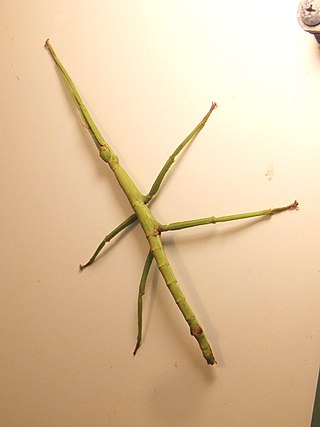
Pharnaciini is a tribe of Asian stick insects, which includes the world's longest insects.
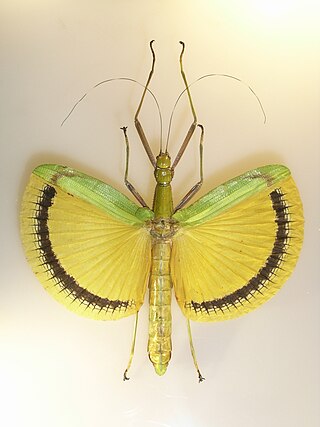
Necrosciinae is a subfamily of the stick insect family Lonchodidae, with its greatest diversity in South-East Asia.
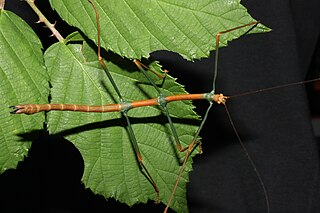
Lonchodes is a genus of stick insects in the family Phasmatidae and the type genus of the family Lonchodidae and tribe Lonchodini. Species have a known distribution that includes tropical Asia and the Pacific.

Ramulus is an Asian genus of stick insects in the family Phasmatidae and tribe Clitumnini.

Pseudosermyle is a genus of walkingsticks in the family Diapheromeridae. There are more than 20 described species in Pseudosermyle.

The Clitumninae are a sub-family of stick insects in the family Phasmatidae found in Asia. The type genus Clitumnus is now considered a synonym of Ramulus.

The Lonchodinae are a subfamily of stick insects in the family Lonchodidae found in: Australasia, Asia, Africa, Southern America and the Pacific.
Medauromorpha is an Asian genus of stick insects in the family Phasmatidae, subfamily Clitumninae and tribe Medaurini. Species have a known distribution from Vietnam and southern China.

The Gratidiini are a tribe of stick insects based on the type genus Clonaria and first used by Cliquennois in 2005. Genera are known to be distributed in: Africa, Europe, temperate and tropical Asia and various Pacific Islands.

The Platycraninae are an anareolate subfamily of stick insects in the family Phasmatidae. Their known distribution includes southern, southeast Asia and Australasia.
Pachymorpha is a genus of phasmids belonging to the family Diapheromeridae.
Zehntneria is a genus of stick insects belonging to the tribe Gratidiini. The species of this genus are found in Central Asia and Southern Asia.
Rhamphophasma is a genus of stick insects in the tribe Clitumnini, erected by Carl Brunner von Wattenwyl in 1893. Species have been recorded from: China, Vietnam, India, Myanmar and Japan.
Metentoria is a genus of stick insects in the tribe Clitumnini, erected by Carl Brunner von Wattenwyl in 1907. Species have been recorded from: India and Vietnam.
Prosentoria is a genus of stick insects in the tribe Clitumnini, erected by Carl Brunner von Wattenwyl in 1907. Species have been recorded from: Vietnam and Borneo.

Parapachymorpha is a genus of stick insects in the tribe Medaurini, erected by Carl Brunner von Wattenwyl in 1893. Species have been recorded from: China, Myanmar, Thailand, Cambodia and Vietnam.












